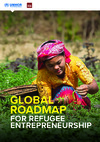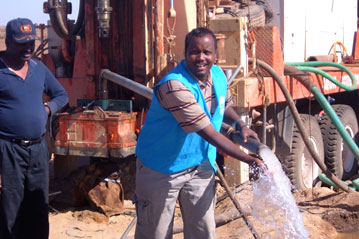UNHCR optimistic about meeting water needs of refugees in Ethiopia
UNHCR has always faced difficulties ensuring that refugees in eastern Ethiopia have enough water, but is optimistic that new projects will solve the problem.
ADDIS ABABA, Ethiopia, April 2 (UNHCR) - Over the past two decades, UNHCR has helped more than 600,000 Somali refugees in the eastern lowlands of Ethiopia. Providing them with enough water has always been a problem, with the UN refugee agency facing funding shortfalls, meagre and difficult to access underground reserves, and competition from locals for the scarce resource.
That's as true today as it was in 1991, when Somalia started disintegrating after the fall of the Siad Barre regime and people began fleeing. Most of the refugees eventually returned home, with just 16,000 remaining in Kebribeyah camp. But renewed conflict in Somalia has led to fresh influxes, prompting UNHCR to open the Aw Barre and Shedder camps in 2007 and 2008 respectively.
Under UNHCR's emergency guidelines, a person needs at least seven litres a day to survive and 20 litres a day to ensure their well-being and good health. Currently, that minimum standard of 20 litres is not being met in any of the three camps, but UNHCR believes that projects now under way should ensure that this target is reached and that access to water outlets is improved.
To meet the needs of Kebribeyah, the former Hartisheik camp and local communities, UNHCR in 2004 opened a pipeline to transport water from the well watered Jarar Valley, some 20 kilometres away.
But, as UNHCR Representative in Ethiopia Moses Okello noted, "Even this huge project does not guarantee an adequate supply of water to every family in the camp. Technical problems, and the high cost of managing the system, mean occasional failure to meet the minimum daily standard of water."
To resolve this problem, the UN refugee agency and the Ethiopian Electric Power Corporation have been working to connect the Jara Valley water supply system to the national electricity grid, which will make it cheaper to power the system than using fuel-guzzling generators. Okello believes this will solve many of the problems related to running the facility.
Meanwhile, to meet daily needs in the Aw Barre and Shedder camps, UNHCR had to truck large quantities of water from a nearby town, drill boreholes and construct a distribution network to ensure that refugees did not have to go far to get access to water.
Okello said that thanks to special funds made available for water and sanitation projects by UN High Commissioner for Refugees António Guterres, "We have been drilling and interconnecting half a dozen boreholes in the two camps. So far we have managed to provide a daily average of 12 litres per person in the two camps."
It is a work in progress. But Okello said he was optimistic that the minimum standard per person of 20 litres a day would be achieved in all three camps once the various water projects had been completed.
Somali refugee Rahma Mohammed Jamale, who fled to Ethiopia to escape conflict in Mogadishu, was one of the first residents of Shedder camp when it opened in May last year. She said it was initially tough finding enough water for herself and her six children.
"We had only two water points for a whole zone and that meant queuing up for hours to get a jerry can of water," she said, adding that the situation was much better but more work was still needed to increase the water supply for the camp's 6,600 refugees and Ethiopians living nearby.
Jamale said the improved water situation meant that children in the camp were spending more time in school and less time lining up for water. "But for this positive development to be sustained, it is up to us refugees to guard the system against misuse," she added.
By Kisut Gebre Egziabher in Addis Ababa, Ethiopia
Related news and stories
Thousands of newly arrived Somali refugees in Ethiopia relocated to new settlement
Samira's Story
Drought brings life-threatening food shortages for refugees in Ethiopia
100,000 new Somali refugees arrive in Ethiopia in the past month, UN and partners are calling for urgent funding
UNHCR teams and partners rush assistance to some 100,000 newly arrived Somali refugees in hard-to-reach area of Ethiopia
As the Horn of Africa drought enters a sixth failed rainy season, UNHCR calls for urgent assistance
-

Nikki Mackliff
Nikki Mackliff is an Ecuadorian singer and songwriter who has collabrated with UNHCR since mid-2022. She is a young rising star in Ecuador in the region known for her upbeat music in the genre of Latin Pop, and for winning several musical awards, including revelation artist, since the start of her career in 2010. She has also began exploring one of her other passions: acting in theatre and in the first online musical series in Ecuador. -

UNHCR deplores continued deportation of Myanmar asylum-seekers from Malaysia
25 Oct 2022 -

UNHCR's Grandi sounds alarm as drought grips Horn of Africa
25 Oct 2022 -

UNHCR's unprecedented US$700m funding gap spells catastrophe for millions
24 Oct 2022 -

Data shows impacts of rising prices and shrinking aid on forcibly displaced people
24 Oct 2022 A new data visualization reveals how the ripple effects of the Ukraine war are impacting refugees and internally displaced people in parts of the world far from the media spotlight. -

Global Roadmap for Refugee Entrepreneurship
24 Oct 2022 The Global Roadmap for Refugee Entrepreneurship provides strategic guidance for UNHCR and partners to support refugee entrepreneurship, reflecting on available opportunities and global best practices in the field. The roadmap is based on research findings from global and regional desk reviews in Europe, MENA, the Americas, East and Horn of Africa and the Great Lakes, West and Central Africa, Southern Africa, and Asia, with focus on 21 countries. Extensive consultation informed the roadmap involving primary data collection from 47 interviews and 10 consultation meetings with UNHCR country, regional, and global-level staff and partners, as well as with major development actors, and practitioners. -

Displaced women in South Sudan work to hold back floodwaters
21 Oct 2022 Armed only with buckets and determination, hundreds of displaced women worked to clear the road which is a lifeline between their camp and the city of Bentiu. -

Devastation in South Sudan following fourth year of historic floods
21 Oct 2022 -

Hungary (explanation of position)
20 Oct 2022

